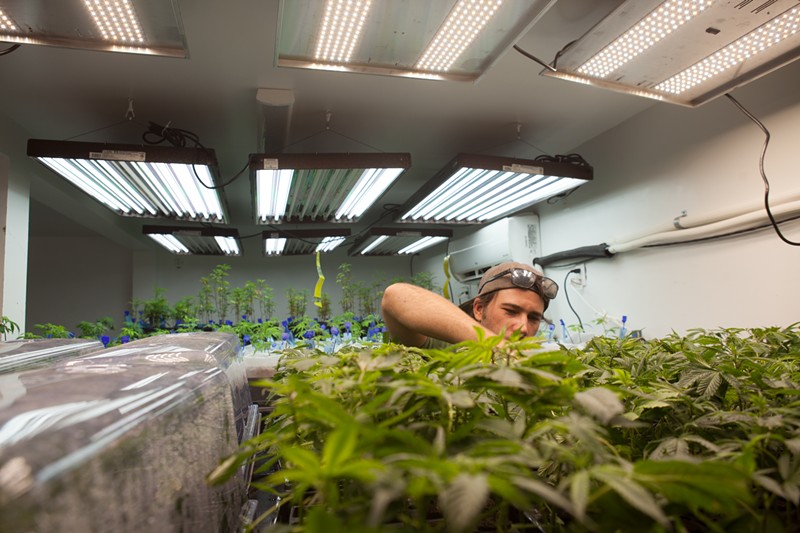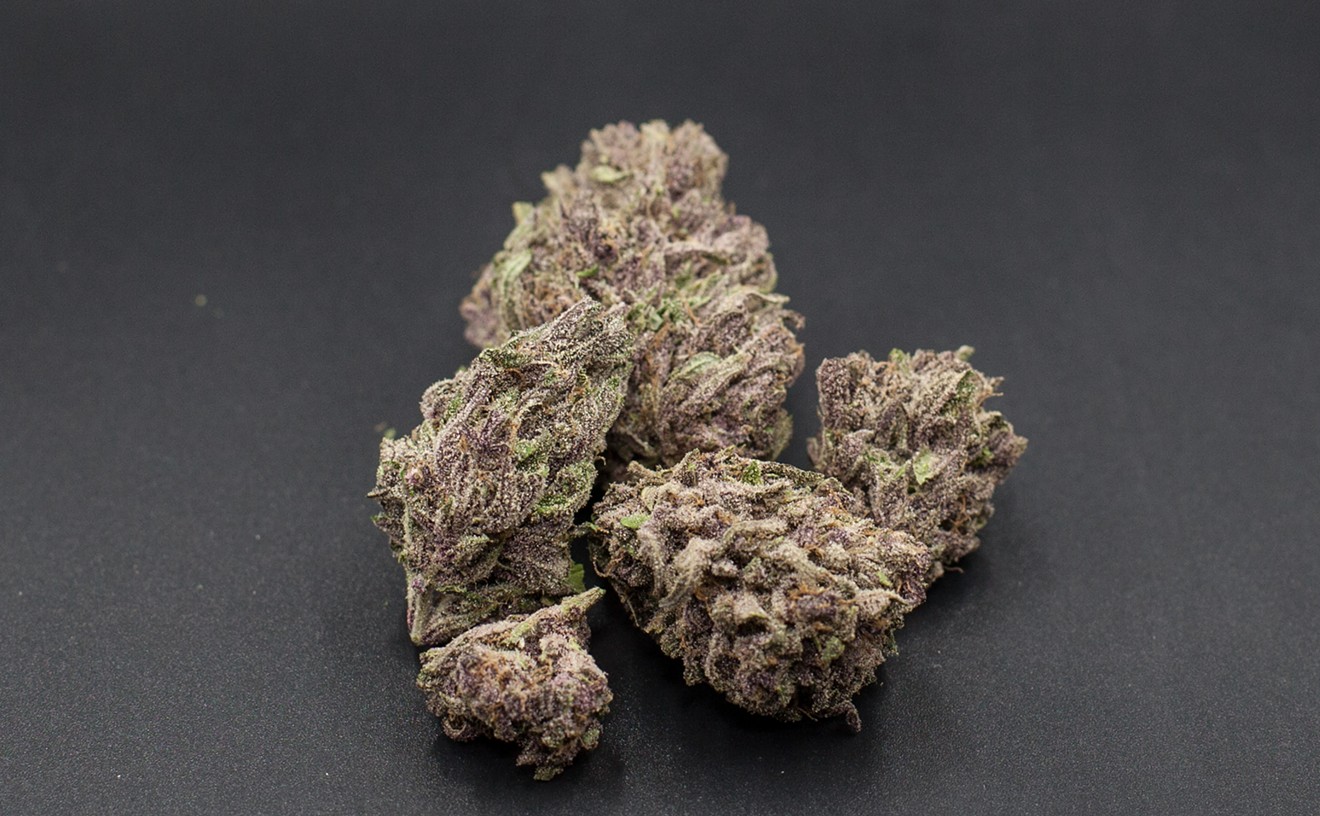College cannabis courses aren't new in Colorado. Most of this state's major universities and even community colleges offer at least one class related to legal pot, and the University of Denver has not just cannabis business courses, but law and journalism classes for students pursuing degrees in related areas. So far, though, DU has not offered a major specific to cannabis.
In order to create faster pathways to the cannabis workforce, DU partnered with Green Flower, a California-based cannabis training program service. The school's three new cannabis training courses each span a semester, but carry certifications instead of college accreditation. Although that might turn off DU students busy with their core classes, non-accredited training programs can be a less expensive entry point for people seeking a new career path. After all, a certification still comes with DU's name on it.
Green Flower and DU's three current certification courses focus on the agriculture, business and medicinal applications of cannabis. The online programs are currently enrolling for summer courses and are expected to continue in the fall semester, as well.
While the business and medical marijuana curriculums are interesting, only one class will teach you how to grow the plant. To learn more about what students can expect from the agriculture and horticulture course, we spoke with Joe Barnard, Green Flower's head of curriculum and accreditation.
Westword: Cannabis cultivation is a hands-on trade. How do you effectively teach students about it online without physical examples?
Joe Barnard: The program teaches the fundamentals of cannabis cultivation, so that the students understand the process from seed to sale. There are dozens of well-produced videos that show the learner what is being spoken about. Also, there are many assignments that require the student to get out and learn, then come back and report about it. Lastly, as part of the student’s portfolio project, they grow their own plant.
So the students are expected or encouraged to grow at home during the course?
Yes. It is part of their final project that starts in the first week of course two.
Colorado is further along than most states with legal cannabis, but growing practices still differ grow to grow. How universal are cannabis growing practices nowadays, and what sort of techniques should students expect to learn in the cannabis agriculture course?
The students learn about genetics, watering essentials, key nutrients, when to harvest, proper curing and storing techniques, etc. Although practices differ grow to grow, these general key practices and techniques are covered [everywhere].
What are some career steps and challenges a prospective cannabis grower should expect in today's state-by-state industry?
A prospective cannabis grower should understand that there is gigantic opportunity to move up and excel. Turnover is a huge challenge with cannabis grows, and understanding what is expected throughout the entire process of growing cannabis, coupled with some dedicated hard work, is a good career move.
Cannabis sales and wholesale prices have been dropping. How do you discuss current job markets with your students, and what sort of jobs should they expect to compete for with the certification?
Current events are part of the weekly discussions in the program. Students should expect to compete and excel for jobs at the entry level to managerial level.
Is Colorado a strong space for new or entry-level cannabis growers, or should they be looking at other states that are newer to legalization?
Even though Colorado is further along, all states have a problem with employee turnover. By having programs like this, it establishes an understanding of what is to be expected of them. All states are looking for new and entry-level cannabis growers, including Colorado.
A good portion of today's commercial growers got their experience outside of universities and secondary educational courses. How important is a certificate or degree in the commercial cannabis cultivation space nowadays?
By offering certificates and degrees at universities and secondary education facilities, it helps to standardize the industry. Currently one major problem with the industry is the lack of standards. Similar to other agriculture certificates and degrees, one in cannabis should be no different.
How much could some apply these practices at home? Can this course help out someone interested in growing as a home hobby?
Absolutely! Again, as part of their final project, students grow their own plant. They are also guided through the process, from planting the seed to curing and storing the plant, throughout the program.

Audio By Carbonatix
[
{
"name": "Air - MediumRectangle - Inline Content - Mobile Display Size",
"component": "12017618",
"insertPoint": "2",
"requiredCountToDisplay": "2",
"watchElement": ".fdn-content-body",
"astAdList": [
{
"adType": "rectangle",
"displayTargets": "mobile"
}
]
},{
"name": "Editor Picks",
"component": "17242653",
"insertPoint": "4",
"requiredCountToDisplay": "1",
"watchElement": ".fdn-content-body",
"astAdList": [
{
"adType": "rectangle",
"displayTargets": "desktop|tablet"
},{
"adType": "rectangle",
"displayTargets": "desktop|tablet|mobile"
}
]
},{
"name": "Inline Links",
"component": "18838239",
"insertPoint": "8th",
"startingPoint": 8,
"requiredCountToDisplay": "7",
"maxInsertions": 25
},{
"name": "Air - MediumRectangle - Combo - Inline Content",
"component": "17261320",
"insertPoint": "8th",
"startingPoint": 8,
"requiredCountToDisplay": "7",
"maxInsertions": 25,
"watchElement": ".fdn-content-body",
"astAdList": [
{
"adType": "rectangle",
"displayTargets": "desktop|tablet"
},{
"adType": "rectangle",
"displayTargets": "desktop|tablet|mobile"
}
]
},{
"name": "Inline Links",
"component": "18838239",
"insertPoint": "8th",
"startingPoint": 12,
"requiredCountToDisplay": "11",
"maxInsertions": 25
},{
"name": "Air - Leaderboard Tower - Combo - Inline Content",
"component": "17261321",
"insertPoint": "8th",
"startingPoint": 12,
"requiredCountToDisplay": "11",
"maxInsertions": 25,
"watchElement": ".fdn-content-body",
"astAdList": [
{
"adType": "leaderboardInlineContent",
"displayTargets": "desktop|tablet"
},{
"adType": "tower",
"displayTargets": "mobile"
}
]
}
]












